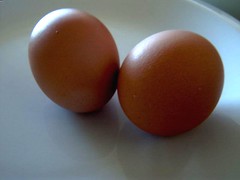 The three weeks I have been in
The three weeks I have been in But coming to the larger question: Is all Organic food better than industrially produced food? Despite tall claims by Organic producers, there is no conclusive evidence yet in any direction. At least, the regulators in developed countries (e.g. US Dept. of Agriculture) have tried to ensure that people who label their produce "Organic" follow stringent production standards. All the same, Organic has become a successful concept. Whole Foods has clocked sales of ~$4bn and is growing. What used to be popular only among hippies, has now been embraced by the middle class. Even the mighty Wal-Mart is exploring this segment. What explains this success given high prices and lack of any conclusive evidence? Well, if the concept of God can be so successful while being expensive (prayer offerings, gilded temples) and lacking any evidence, why can't organic food follow the same track? Also, there will always be a segment of people who will believe that old times were much better than present days. That’s why many of us still live by religious texts written hundreds of years back by people who also knew that the world was flat without any
Why do I go to Whole Foods? Because it is right next door to my apartment and there are no large supermarkets nearby. Also the staff at Whole Foods is much friendlier than those at Wal-Mart, Safeway or Target. Probably most people go by the same thought process.
2 comments:
Organic food is produced without the use of pesticides and chemical fertilizers - this reduces health hazards for us, prevents development of resistance among pests, and prevents loss of biodiversity.
Organic farming promotes sustainable soil use which helps control erosion and flooding.
Organic farming promotes sutainable water use, preventing wastage of water.
Organic farming makes minimal use of fossil fueld, thereby not contributing to air pollution, and helping conserve these non-renewable resources.
And like Thomas mentioned, organic foods are all natural and tend to retain flavor better.
Yes, I just finished an environmental course and am full of gyann !:)
I believe that in future there will be a market for both industrial and organic food. Industrial food is cheap and most people in the third world are yet to get rid of malnutrition. Also entry of players like Wal Mart in the organic food segment will help bring down prices.
While I agree with Thomas that organic is more helpful for environment than for immediate consumer needs, the organic producers claim both and that too strongly.
Post a Comment